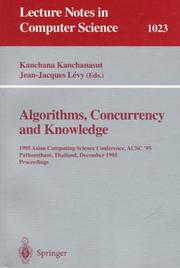| Listing 1 - 4 of 4 |
Sort by
|

ISBN: 3540606882 0387606882 3540492623 9783540606888 Year: 1995 Volume: 1023 Publisher: Berlin : Springer-Verlag,
Abstract | Keywords | Export | Availability | Bookmark
 Loading...
Loading...Choose an application
- Reference Manager
- EndNote
- RefWorks (Direct export to RefWorks)
This volume constitutes the refereed proceedings of the 1995 Asian Computing Science Conference, ACSC 95, held in Pathumthani, Thailand in December 1995. The 29 fully revised papers presented were selected from a total of 102 submissions; clearly the majority of the participating researchers come from South-East Asian countries, but there is also a strong international component. The volume reflects research activities, particularly by Asian computer science researchers, in different areas. Special attention is paid to algorithms, knowledge representation, programming and specification languages, verification, concurrency, networking and distributed systems, and databases.
Computer algorithms --- Parallel processing(Electronic computers) --- Knowledge representation (Information theory) --- Congresses. --- Congresses --- Parallel processing (Computer science) --- Information theory. --- Software engineering. --- Artificial intelligence. --- Computer software. --- Theory of Computation. --- Software Engineering/Programming and Operating Systems. --- Artificial Intelligence. --- Algorithm Analysis and Problem Complexity. --- Software, Computer --- Computer systems --- AI (Artificial intelligence) --- Artificial thinking --- Electronic brains --- Intellectronics --- Intelligence, Artificial --- Intelligent machines --- Machine intelligence --- Thinking, Artificial --- Bionics --- Cognitive science --- Digital computer simulation --- Electronic data processing --- Logic machines --- Machine theory --- Self-organizing systems --- Simulation methods --- Fifth generation computers --- Neural computers --- Computer software engineering --- Engineering --- Communication theory --- Communication --- Cybernetics --- Computer algorithms - Congresses --- Parallel processing(Electronic computers) - Congresses. --- Knowledge representation (Information theory) - Congresses
Book
ISBN: 0857290754 0857290762 Year: 2011 Publisher: London : Springer London : Imprint: Springer,
Abstract | Keywords | Export | Availability | Bookmark
 Loading...
Loading...Choose an application
- Reference Manager
- EndNote
- RefWorks (Direct export to RefWorks)
The design and implementation of programming languages, from Fortran and Cobol to Caml and Java, has been one of the key developments in the management of ever more complex computerized systems. Introduction to the Theory of Programming Languages gives the reader the means to discover the tools to think, design, and implement these languages. It proposes a unified vision of the different formalisms that permit definition of a programming language: small steps operational semantics, big steps operational semantics, and denotational semantics, emphasising that all seek to define a relation between three objects: a program, an input value, and an output value. These formalisms are illustrated by presenting the semantics of some typical features of programming languages: functions, recursivity, assignments, records, objects, ... showing that the study of programming languages does not consist of studying languages one after another, but is organized around the features that are present in these various languages. The study of these features leads to the development of evaluators, interpreters and compilers, and also type inference algorithms, for small languages.
Electronic -- Programming. --- Programming languages (Electronic computers) -- Semantics. --- Programming languages (Electronic computers). --- Programming languages (Electronic computers) --- Engineering & Applied Sciences --- Computer Science --- Semantics --- Computer programming. --- Computers --- Electronic computer programming --- Electronic data processing --- Electronic digital computers --- Programming (Electronic computers) --- Computer languages --- Computer program languages --- Computer programming languages --- Machine language --- Programming --- Computer science. --- Computers. --- Computer logic. --- Computer Science. --- Theory of Computation. --- Logics and Meanings of Programs. --- Coding theory --- Languages, Artificial --- Information theory. --- Logic design. --- Design, Logic --- Design of logic systems --- Digital electronics --- Electronic circuit design --- Logic circuits --- Machine theory --- Switching theory --- Communication theory --- Communication --- Cybernetics --- Semantics. --- Computer science logic --- Logic, Symbolic and mathematical --- Automatic computers --- Automatic data processors --- Computer hardware --- Computing machines (Computers) --- Electronic brains --- Electronic calculating-machines --- Electronic computers --- Hardware, Computer --- Computer systems --- Calculators --- Cyberspace
Digital
ISBN: 9780857290762 Year: 2011 Publisher: London Springer London
Abstract | Keywords | Export | Availability | Bookmark
 Loading...
Loading...Choose an application
- Reference Manager
- EndNote
- RefWorks (Direct export to RefWorks)
Logic --- Computer science --- toegepaste informatica --- ontwerpen --- programmeren (informatica)
Book
ISBN: 9780857290762 Year: 2011 Publisher: London Springer London
Abstract | Keywords | Export | Availability | Bookmark
 Loading...
Loading...Choose an application
- Reference Manager
- EndNote
- RefWorks (Direct export to RefWorks)
The design and implementation of programming languages, from Fortran and Cobol to Caml and Java, has been one of the key developments in the management of ever more complex computerized systems. Introduction to the Theory of Programming Languages gives the reader the means to discover the tools to think, design, and implement these languages. It proposes a unified vision of the different formalisms that permit definition of a programming language: small steps operational semantics, big steps operational semantics, and denotational semantics, emphasising that all seek to define a relation between three objects: a program, an input value, and an output value. These formalisms are illustrated by presenting the semantics of some typical features of programming languages: functions, recursivity, assignments, records, objects, ... showing that the study of programming languages does not consist of studying languages one after another, but is organized around the features that are present in these various languages. The study of these features leads to the development of evaluators, interpreters and compilers, and also type inference algorithms, for small languages.
Logic --- Computer science --- toegepaste informatica --- ontwerpen --- programmeren (informatica)
| Listing 1 - 4 of 4 |
Sort by
|

 Search
Search Feedback
Feedback About UniCat
About UniCat  Help
Help News
News